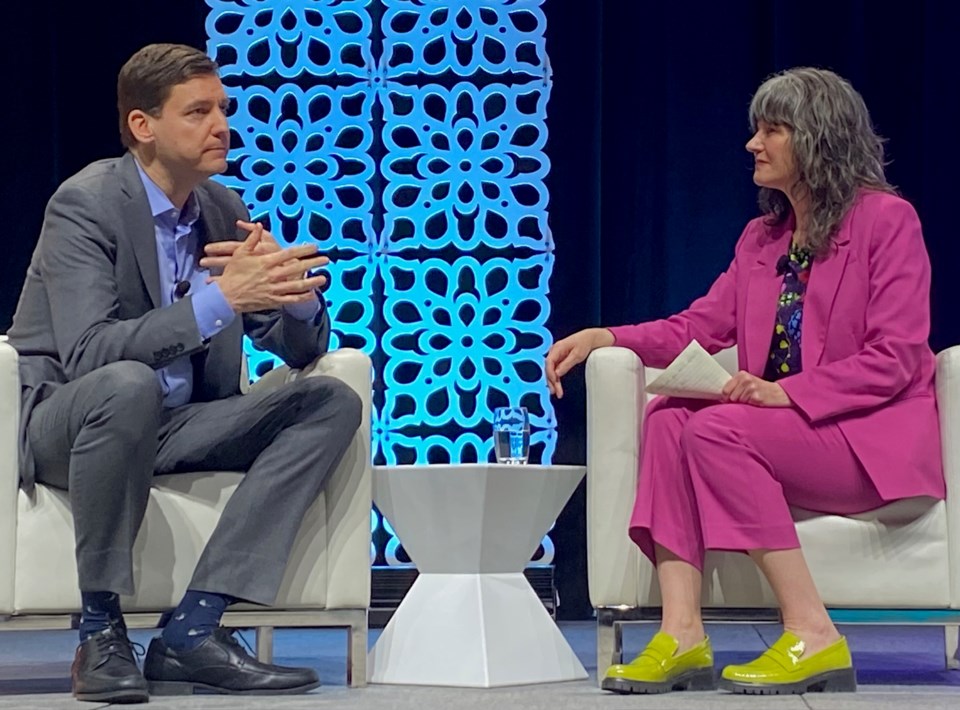With consumers feeling the bite of ever-increasing carbon taxes, and business leaders pushing back on the potential economic costs of B.C.’s climate change policies, David Eby’s NDP government is coming under increasing pressure to take its foot off the CleanBC accelerator.
Recently, the Business Council of BC (BCBC) pointed out that the provincial government’s own economic analysis projects the West Coast economy could be $28 billion smaller by 2030 under the CleanBC plan than without it.
And the Mining Association of BC (MABC) has voiced concerns about a new industrial carbon pricing system that goes into effect April 1, along with a $15 hike to the broader carbon tax, which will push it to $80 per tonne of CO2.
But during an address at the Globe Forum in Vancouver Wednesday morning, Eby pointed to recent climate related scourges and disasters to justify his government plans to continue with its climate change mitigation and adaptation plans.
Those environmental disasters have included a mountain pine beetle epidemic that left B.C. with a timber shortage and subsequent sawmill and pulp mill closures, a record-breaking year for forest fires in 2023, catastrophic floods and landslides in 2021, and an ongoing drought that has lowered water levels in hydro-electric dams and virtually dried up Cowichan River on Vancouver Island last summer.
“The good news is, in my opinion – and I’m staking my political career on it – British Columbians, because we’re on the front lines of these impacts … we’re also well positioned to understand why we need to do the work, why we need to show climate leadership.
“Business certainty that I can assure you of, as leader of British Columbia, is that we will not back down on climate action,” Eby said.
“British Columbia will be strong on climate, even if we’re the only province in Canada standing strong on climate, because in British Columbia, we don’t see another choice. Anyone who tells you that there’s another choice is lying to you as a politician.”
The biennial Globe Forum draws business leaders, policymakers and non-government organizations from far and wide to discuss sustainability issues.
In a fireside chat with Eby, Megan Leslie, president of the World Wildlife Fund, noted that B.C. has greater biodiversity than any other province, but also the most species at risk.
This gave Eby the opportunity to point to his government’s 30 By 30 plan, which aims to set aside 30 per cent of B.C.’s land and waters for conservation, backed up by about $1 billion in funds from senior government, environmental groups and First Nations to allow for economic opportunities.
Though B.C.’s economy is diversified, with a vibrant high-tech sector and film industry, it is still largely resource-based, with forestry, mining and oil and gas accounting for the lion’s share of B.C.’s exports and jobs.
There are fears that these industries, which are by nature emissions-intense, are not compatible with B.C.’s ambitious climate action policies, which includes a new output-based carbon pricing system that the MABC says will put B.C. mines at a competitive disadvantage, and an emissions cap for the oil and gas sector that some business leaders warn may squelch B.C.’s nascent LNG industry.
Eby talked about B.C.’s advantage as a clean electricity powerhouse, however, which means that everything produced in B.C. – from aluminum to lumber – is the “lowest carbon intensity product that is available in the world.”
He noted that his government, through BC Hydro, has committed to spending $36 billion over the next decade – a 50 per cent increase over BC Hydro’s 10-year spending plan – to increase transmission and generating capacity of clean electricity. The idea is to electrify industry as much as possible to reduce its emissions intensity.
“We need to produce these resources in order to respond to climate change, and we can show the world how it’s done,” Eby said.
He said there are currently 19 hydrogen projects proposed for B.C. and more than a dozen critical-mineral mine proposals.
As for B.C.’s nascent LNG industry, Eby spoke of it as though it is an industry with a short shelf life.
“We’re recognizing that LNG is not forever, and it is not our salvation,” he said. “It is all these other pieces that we need to be looking to the future as a zero-carbon future.”
While the B.C. government’s CleanBC plan calls for billions in investments in climate mitigation, the government’s climate policies also will require billions in spending for adaptation, including in flood prevention.
“It’s almost mind-boggling how much we’re going to have to put into it,” Eby said.





